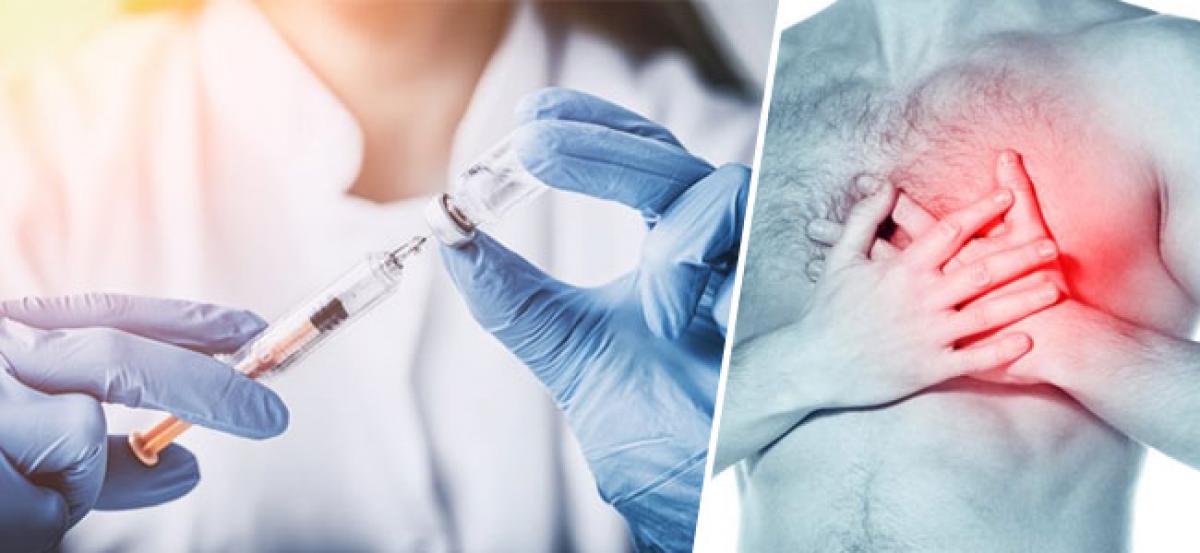Live
- Bengal Assembly: BJP stages walkout after MLA's microphone 'disconnected'
- AP Mega DSC Syllabus Released Ahead of issuance of Notification
- Exciting Future Space Missions by ISRO: Venus, Moon, Mars, Human Spaceflight, and More
- Space Station Safety Alert: Toxic Smell Detected After Russian Cargo Docking
- Protests in Tripura against Hindu priest's arrest in Bangladesh
- Sambhal miscreants being identified through CCTV, will face strict action: UP Minister
- Sambhal violence: Police release photos of rioters including three women
- AI-Enhanced HR Co-Pilot Max Sara 2.0 Rolled Out
- Hyderabad SBI Branch Prevents Senior Citizen from Falling Victim to Rs 13 Lakh Scam
- Maharashtra CM Post: Eknath Shinde's Plan B
Just In

A vaccine jab to immunise people against high levels of cholesterol and the narrowing of the arteries may soon be possible, according to a study in mice published today. The vaccine called AT04A
London: A vaccine jab to immunise people against high levels of cholesterol and the narrowing of the arteries may soon be possible, according to a study in mice published today. The vaccine called AT04A induces antibodies against a target protein that is produced by the body, researchers said. The researchers injected AT04A under the skin in mice that were fed fatty, Western-style food in order to induce high cholesterol and the development of atherosclerosis.
Th study, published in the European Heart Journal, found that the vaccine reduced the total amount of cholesterol by 53 per cent. It also shrank atherosclerotic damage to blood vessels by 64 per cent, and reduced biological markers of blood vessel inflammation by 21-28 per cent, compared to unvaccinated mice. "AT04A was able to induce antibodies that specifically targeted the enzyme PCSK9 throughout the study period in the circulation of the treated mice," said Gunther Staffler, chief technology officer at AFFiRis - bio tech company that developed the vaccine.
"As a consequence, levels of cholesterol were reduced in a consistent and long-lasting way, resulting in a reduction of fatty deposits in the arteries and atherosclerotic damage, as well as reduced arterial wall inflammation," Staffler added. The reduction in total cholesterol levels was significantly correlated with induced antibody concentration, proving that induced antibodies caused the reduction in cholesterol and also are ultimately responsible for the reduction of atherosclerosis development, researchers said.
As antibody concentrations remained high at the end of the study, it can be assumed they would continue to reduce cholesterol levels for some time afterwards, resulting in a long-lasting effect, as has been shown in previous studies. A phase I trial in patients has started to see if the findings translate to humans. "If these findings translate successfully into humans, this could mean that, as the induced antibodies persist for months after a vaccination, we could develop a long-lasting therapy that, after the first vaccination, just needs an annual booster," said Staffler. "This would result in an effective and more convenient treatment for patients, as well as higher patient compliance," he said.
The study is the first to show that it is possible to immunise genetically modified mice with a molecule that causes the body to produce antibodies against an enzyme called PCSK9, which plays a role in preventing the clearance of low density lipoprotein cholesterol (LDL) or "bad" cholesterol from the blood. People with high levels of LDL cholesterol, either due to their genetic inheritance, or to poor diet and lifestyles, are at much greater risk of developing cardiovascular disease prematurely, researchers said.
These diseases of the heart and blood vessels, caused by atherosclerosis, have overtaken infections as the main cause of illness and death throughout the world, they said. At present, drugs such as statins can be used to lower LDL cholesterol, but they have to be taken on a daily basis and although they are generally well-tolerated they can cause adverse side effects in some people.

© 2024 Hyderabad Media House Limited/The Hans India. All rights reserved. Powered by hocalwire.com







